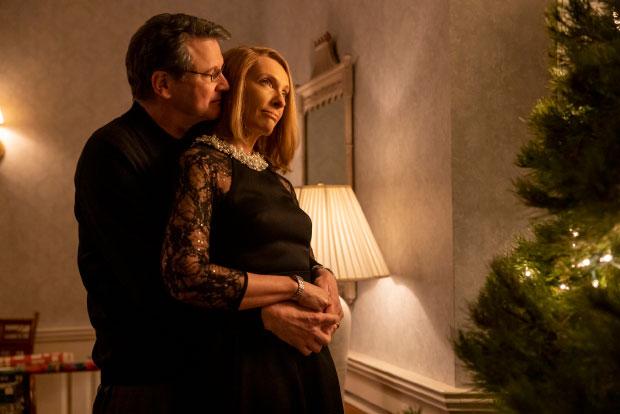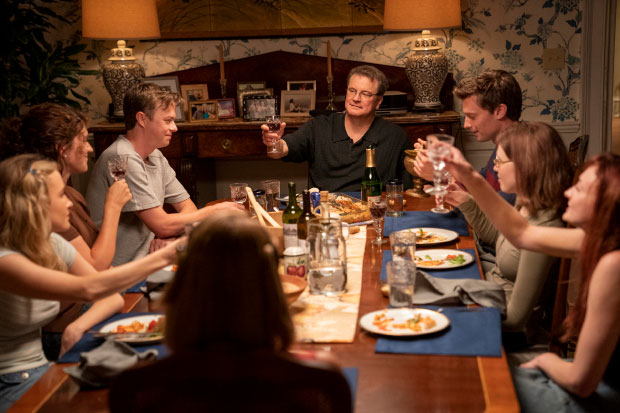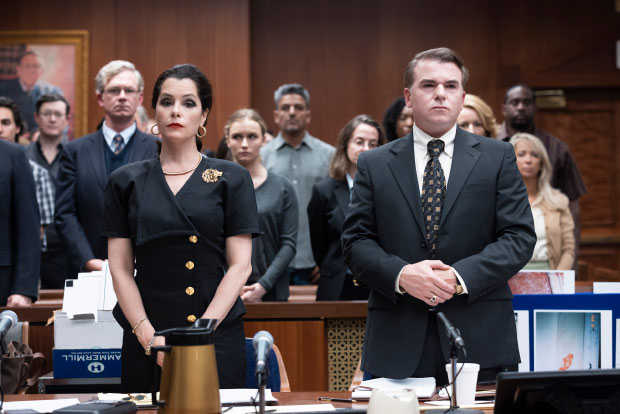HBO Max’s The Staircase is going to be the show everyone is talking about. Kathleen Peterson’s death in 2001 remains a mystery, with true crime fans divided. Was her death a tragic accident? Did her husband, Michael Peterson, kill her? Could an owl have caused her to fall? Over 20 years later, these are still questions that have yet to be answered. This case is a staircase in and of itself — and one that ultimately never ends.
The Staircase, premiering May 5 with the first 3 episodes, is going to pull back the curtain on this gripping case. From the complicated family dynamics to the “unknowable” Michael Peterson to the compelling mysteries to the courtroom drama, this series will have you hooked from the first frame. HollywoodLife spoke EXCLUSIVELY with creator and executive producer Antonio Campos about revisiting the case, giving Kathleen Peterson a voice, speaking to Michael, and more. Read our Q&A below:

I know you said in a previous interview that you watched the documentary years ago on DVDs, which seems like a foreign concept now. What was it about this case and this family that first really intrigued you?
Antonio Campos: Well, I think you must have had experience, too. This case is just fascinating. As someone who’s an avid reader of true crime, it kind of felt like the most perfect true crime story in a way that at its center had a character that was so unknowable. It had one of those mysteries where only two people know what happened that night, and one of them obviously is not here anymore. When I watched the documentary, I knew nothing about it. I was just watching the story unfold and experiencing all these twists and turns. It was just all brand new to me. At the time, as I watched this eight-hour documentary I thought a lot about how there was a whole French crew there this entire time. They were in this person’s house. They were going to court every day. They’d come back at night. There was this level of access that Jean-Xavier [de Lestrade] and Denis [Poncet] had that I just thought was fascinating and something that I wanted to dig deeper into. And the idea that it gave me would be a way of looking at the case from their perspective and then looking at how they created the thing they created that I had watched. Immediately, there was this possibility of looking at it as each person in the story trying to tell their version of the story, and not necessarily looking for the truth. But really just trying to tell the version of the story that fit the narrative that they had created, or that they had wanted to tell. There was so much to unpack and I knew it. When I started, it was very much from the perspective of the filmmakers. Over the course of the years, it just became clear this had to be a series and not a film, which is where it started. The family became such a bigger part of it and the family dynamics. In 2008, the story ended one way, and then by 2011 it ended another way, and then by 2017, there was a whole other ending. It never was uninteresting. There was always more to learn about the story, and there was always something happening with it. It just continued to be fascinating to me and worth dedicating all this time to.
The Netflix documentary made the case go viral on the true-crime side of the internet. People are clearly divided on what really happened. With the show, do you want viewers to come away with a certain viewpoint or maintain this idea that you need to decide for yourself?
Antonio Campos: That aspect of it… you can’t get around it, right? There’s always going to be this part of the story, which is some people think this happened and some people think that happened. But what we would really love is if you leave the story being okay with the gray, being okay with the fact that you may never know. You, the audience, may be compelled to decide one way or another, and I think that you’re going to see over the course of the series three versions of how she could have died, or at least three of the versions that we’ve decided to highlight. You can make a decision I think based on which one feels the most believable to you. But what we’re more interested in is how do you become okay with the unknowable? How do you live with the unknowable? What’s so fascinating is that this is an almost unknowable case with a very unknowable character in the center. It’s just sort of a maze within a maze. Our intent was to explore the real elusive nature of truth and how ultimately the truth gets kind of caught up in storytelling, and everyone trying to tell their version of the story. But ultimately, all of that is motivated by personal feelings. And that’s the other aspect of this case. It’s very specific because I think so much of what people decide about Michael Peterson has nothing to do with the evidence. It’s so much about how you feel about him. I think that’s a fascinating thing. People are so adamant about how they feel about whether or not he did it. And when you ask them why it’s like, well, he’s clearly very suspicious. And the other side goes, well, he’s such a good father. Neither one of those things is proof that he did or he didn’t do anything. For us, it was trying to unpack that experience, unpack why is that Michael Peterson is this kind of Rorschach. What is it about this guy and what makes him that way? That’s part of the other aspect of our story. What made this guy be the way he is? There’s this really fascinating thing that the filmmaker says in the show, which is, “Even when you know Michael Peterson is telling the truth, it seems like he’s lying.” And you’re like, well, why is that? We tried to get to the bottom of that.
In the documentary, Michael Peterson was the “star.” With the show, it’s clear that you’re trying to tell Kathleen’s story for the first time. Were you always determined to give her a voice?
Antonio Campos: Yes. From the very beginning. I mean, it just felt like this big void in the documentary. Anybody who watched the case, you want to understand who this person was, and what their life was like before they died. Everyone’s operating before December 9 as though life is just going to keep going, and that’s a really interesting place to be. What we are interested in is this idea that we know that she’s going to die on December 9. We don’t know exactly how, but we know that she’s going to die. We have to create a story that could lead to any one version of these deaths. That’s what we set about doing really kind of creating a portrait of Kathleen in the months leading up to her death that could have resulted in one of these three versions of it.

Did you contact Michael?
Antonio Campos: We did talk to a lot of people involved in this story. We did talk to Michael. I had been involved with the story for a very long time and hadn’t talked to him. When we started the writers’ room, it really felt like this is certainly a good time to reach out to him. We spoke for a while and then also read his memoir. Everything with Michael Peterson and, honestly, every person involved in a story like this, when you speak to them, you have to take everything they say with a grain of salt because it’s ultimately always going to be what they tell you is also them trying to tell you the version of the story they want you to believe. Not necessarily that it isn’t true, but you do have to always take everything with a grain of salt when you talk to anyone that’s involved in the true story. You have to just kind of cross-reference everything that you can and make a decision about what you know and what you ultimately believe or don’t believe that you’ve heard.
Michael Peterson is just such a fascinating person. What was the casting process like?
Antonio Campos: I mean, it had to be someone who could capture the complexity of this person, this sort of mystery of him, and ultimately was a good enough actor that they could capture the essence of a character, of a person, without doing an impersonation. From the very beginning when we talked about it, we didn’t want anyone to do an impersonation. We wanted everyone to find where they themselves met the real person, and then stop there and not go any further than that. With Colin, it’s just like, here’s this incredible actor. He’s never played a role like this, but we know that he can do it because he is who he is. We’ve seen sort of hints of him playing characters, not like this, but where you can see little aspects of Michael. There were not a lot of characters that Colin played that were dangerous, but there were a couple of moments in different things where saw that. You just can see the complexity of him, that he could be incredibly charming and funny, but also that there will be something underneath and the potential for him because you also have to believe that this person could do something incredibly violent, right? That’s not an easy combination to get with someone, and Colin just had the ability to capture all the different sides of him. We went out to Colin fingers crossed and hoped that he would say yes.
You mentioned that you’re showing three versions of what happened, so I’m assuming you’re going to dive into the owl theory?
Antonio Campos: Yeah, we go into that.
I’m a sucker for good opening credits, and The Staircase opening credits are terrific. What was the inspiration behind the design?
Antonio Campos: That was a tricky one. We worked with a company named Sarofsky, and they had a concept that was a house of glass. And that’s where we started to go. They started to develop this environment that was the Peterson house but sort of made out of glass. Everything is see-through with these sort of three-dimensional figures inhabiting those spaces. As we were filming, I just got this urge to dig deeper into the Escher of it all. That was something that we had talked about very early on, and I had always had this image in my head of a very simple line drawing of a staircase. I always felt like that image of just lines forming and then becoming the staircase. When we started to open up the idea of a glass house to become, well, how do we bring Escher ideas into impossible spaces. It was like, well, let’s start with one line, and let’s see that line grow into a staircase, and then let’s watch other lines develop into a maze, and let’s watch that maze become the different rooms of the house. Within the rooms let’s explore how when you look at it one way, it can do one thing. They had this great idea of forced perspectives, and it was just a really wonderful collaboration where they came with their initial idea, we came with our idea, and then we started to kind of brainstorm and found something that was really original and speaks to so many of the themes in the show. You think that you’re looking at one thing and then you’re actually looking at it, or you think you’re looking at one room, and you’re actually looking at two rooms. Ultimately, the house itself becomes a bit of a maze. And then at the very end what I love is that it goes back to exactly where it started, which was a line forming a staircase. It’s like you build the house and then you completely disrupt it again, and that’s kind of what we’re doing.
Over the course of the filming process, did your opinion of what really happened to Kathleen change from where it started?
Antonio Campos: It’s really interesting. Over the years, I had gone back and forth about how I feel and what I think. I try to keep it to myself. At this point, when people get into that debate of what happened I just kind of sit back and watch and see what everyone is saying and thinking. But yes, over the course of making this, I have had my opinion of what happened that night change. I left at the very end feeling like, well, this is what happened. It’s not something that I want to necessarily share, but I did feel like over the course of making this and exploring the story further in-depth and being able, as much as possible, live out what could have happened and understanding people’s motivations and intentions and dynamics with a different perspective on things, I think that I’d be curious to know at the end of the series how many people’s opinions have changed from what they started with.
I was thinking last night that if this had happened prior to 9/11 or at least a couple of years later, this case would have captured the nation. But it got drowned out, understandably, by 9/11 because it happened just a few months after the attacks.
Antonio Campos: For me, one of the most interesting aspects that I thought about when I watched the documentary was 9/11 because I was in New York City. I was a teenager when 9/11 happened, and my best friend’s father died in one of the Towers, so 9/11 was a big part of changing my reality in a way. When I saw the documentary, I realized she had this pool accident right around 9/11. She died after 9/11 and the world was such a different world after that happened. People were so scared of the unknown after that, and then the French filmmakers come in right when Freedom Fries were becoming a thing. There’s just this whole aspect of the story that isn’t in the documentary that’s really, in my mind, informed by what’s going on in the country and people’s perspectives. The analogy to 9/11 too was a big part of it, the idea that after this event nothing else is the same. I think 9/11 is a huge part of the story and, to your point, it’s also why the story didn’t get more attention at the time. It is interesting because it must have felt to you in North Carolina at the time that everybody was talking about it. That was probably all anyone was talking about in North Carolina at the time.

Absolutely. It was the biggest thing in North Carolina at the time.
Antonio Campos: When you get to the end of the story, you realize there’s another bigger connection to another case that happened 10 years earlier with Greg Taylor. Obviously, that’s something that we get into later in this series. There are just all these different tragic cases in North Carolina in the last 15-20 years. They all kind of come together, or they’re all connected in some way. Rae Carruth was obviously defended by David Rudolf. Were you aware of David Rudolf as a figure when you were that age?
Yes. My mom was into true crime before true crime was a thing. Michael Stuhlbarg channels David Rudolf in such an incredible way.
Antonio Campos: Michael Stuhlbarg and I worked together on Afterschool, my first feature, so I’ve known Michael since 2007. I’d always imagined him in this show from the very beginning. And then Parker Posey… I basically told Parker that I wanted her to play Freda Black in 2009 or 2010. It’s funny because those actors have been in The Staircase in my mind since that time, and they just inhabited those roles in such an incredible way. Parker brought Freda back to life. I knew Parker was perfect, and I knew Parker could do it like no one else, but when she came on to set in those clothes and the hair and that voice, it was just incredible.